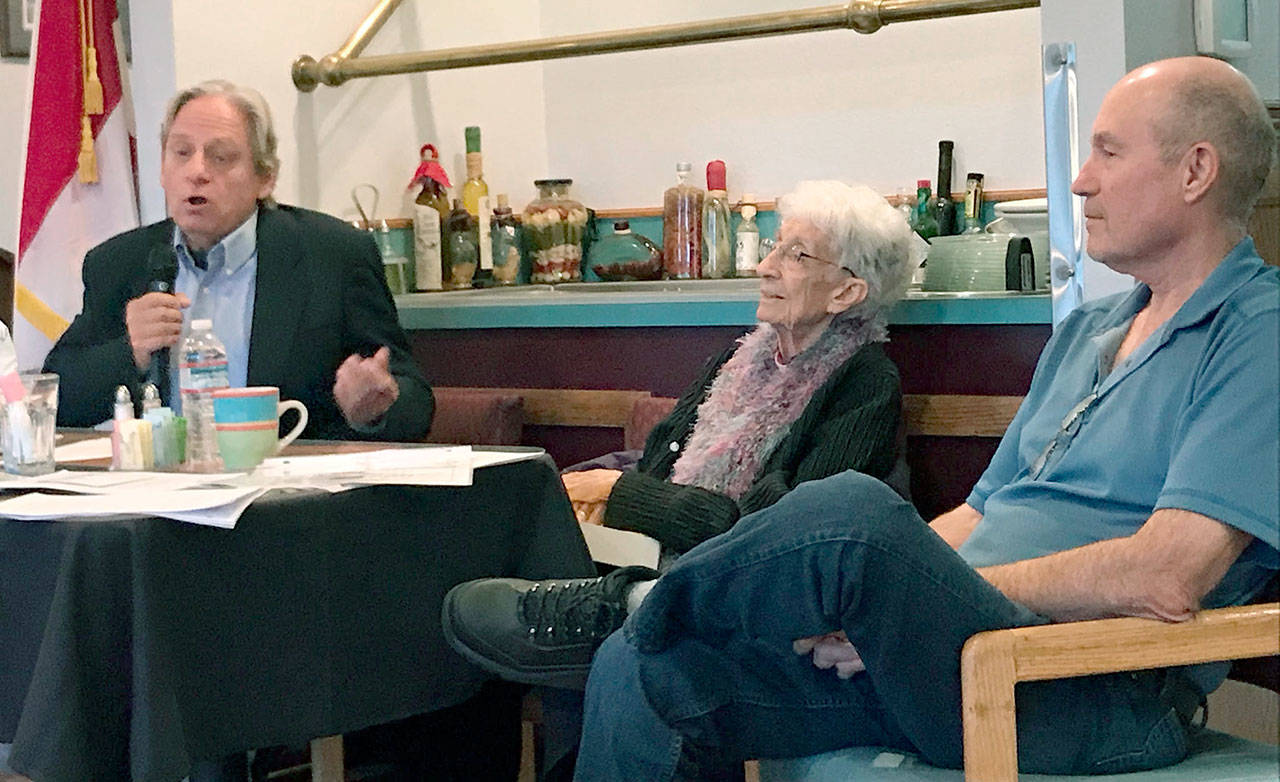PORT ANGELES — Arguments for and against fluoridation were aired Tuesday at a general election forum as city voters prepare to cast advisory ballots Nov. 7 on whether Port Angeles public works should resume adding fluorosilicic acid to the municipal water supply.
Dr. Tom Locke of Sequim accused fluoridation foes of spreading “alternative facts” about the use of water fluoridation to fight dental disease and said the scientific community is behind him, while Jim Bourget of Port Angeles and Eloise Kailin of Sequim said evidence and personal freedom were on the side of keeping it out of the water.
The three spoke for more than an hour to more than 45 participants at the Port Angeles Business Association’s weekly breakfast meeting at Joshua’s restaurant.
The ballot is advisory, so the results are not binding on the seven Port Angeles City Council members, who in August 2016 stopped fluoridating the water in the face of consistent opposition to the practice voiced at council meetings and the anti-fluoridation results of an unscientific water-customer survey.
“However, the Council will be guided by the results of this ballot in deciding whether to resume fluoridation,” the ballot says before asking: “Shall the City of Port Angeles add fluoride to its municipal water supply?”
In August, council members voted to accept the advisory vote as binding.
Locke, the former health officer for Clallam County, is the Jefferson County health officer and a medical director at the Jamestown S’Klallam Tribe’s Family Health Clinic in Sequim.
Kailin, 98, a retired, board-certified allergy and immunology physician who chairs the anti-fluoridation group Our Water, Our Choice!, deferred mostly to Bourget during the forum.
He has a bachelor’s degree in environmental science and owns Bourget Enterprises LLC, a wood products company that harvests old-growth cedar stumps for landscaping.
In a statement written by Kailin and read by Bourget, Kailin said she opposed fluoridation for reasons of “lack of informed consent”; its composition as a non-pharmaceutical-grade “byproduct of the phosphate fertilizer industry”; its links to brittle bones, thyroid problems and fluorosis; and the lack of dose control, lack of side-effects monitoring and contamination of the environment.
She cited a study published in September in Environmental Health Perspectives, a monthly peer-reviewed journal of research and news published with support from the National Institute of Environmental Health Sciences, National Institutes of Health and U.S. Department of Health and Human Services.
“Its results provide probable evidence of poisoning of fetal brains by very low doses of fluoride,” Kailin said.
The results of the study are at http://tinyurl.com/PDN-FluorideStudy.
“Community water and salt fluoridation, and fluoride toothpaste use, substantially reduces the prevalence and incidence of dental caries (Jones et al. 2005) and is acknowledged as a public health success story (Easley 1995),” the study said.
The results are “somewhat consistent” with the ecological studies suggesting children who live in areas with high fluoride exposure have lower IQ scores than those who live in low-exposure or control areas, it said.
“Our findings must be confirmed in other study populations, and additional research is needed to determine how the urine fluoride concentrations measured in our study population are related to fluoride exposures resulting from both intentional supplementation and environmental contamination.
“However, our findings, combined with evidence from existing animal and human studies, reinforce the need for additional research on potential adverse effects of fluoride, particularly in pregnant women and children, and to ensure that the benefits of population-level fluoride supplementation outweigh any potential risks.”
Locke said that despite near-unanimous support in the scientific community for fluoridation, anti-fluoridation activists have targeted Port Angeles ever since 2006, when community fluoridation began.
“These folk are the original alternative facts movement,” Locke said, comparing them to people opposed to vaccinations.
“Demonizing fluoride is scientifically ridiculous.”
He said fluoridation saves about $34 in dental care costs for every $1 spent on fluoridation.
In a later interview Tuesday, Locke said it was the figure most cited by the Centers for Disease Control and Prevention, which at http://tinyurl.com/PDN-CDC-Fluoride said the savings were $38 for every $1 spent.
Bourget said there has never been a single double-blind study — “the gold standard for studies,” he said — to examine the effectiveness of fluoridation.
Locke said a double-blind study would be difficult to conduct because “everybody consumes fluoride,” which is naturally occurring.
Locke said fluorosilicic acid is a water additive and one of more than 40 chemicals added to the public water system, including chlorine, which when diluted “is quite safe to drink.”
Europe, where many countries do not fluoridate their water, is ahead of the U.S., a meeting participant said.
Locke said many European countries do not have centralized water supplies, making municipal water fluoridation difficult; some nations fluoridate salt, for example, and have universal access to dental care.
He said courts have overridden “the individual liberty issue” for the sake of public health benefits derived from fluoridation.
“Public water is the public’s,” he said.
If people want their own personal water, “they can get it,” Locke said.
Public water should be “pure and clean,” Bourget said. “I don’t want to ingest anything into my body that I don’t choose to.
“One of the most critical aspects of the U.S. and [this] system is individual personal choice, which I think most of the world would like to have.”
Locke responded that there have been more than 30,000 studies on the efficacy of fluoridation.
“A lot of negative research is looking at naturally occurring fluoride that is in excessive levels,” he said.
“There’s no way to say how much we are getting,” responded Bourget. “It’s time to rethink this and end it.”
________
Senior Staff Writer Paul Gottlieb can be reached at 360-452-2345, ext. 55650, or at pgottlieb@peninsuladailynews.com.

